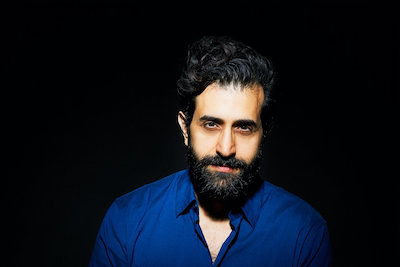by Jarrett Hoffman

•A new project from tenor Karim Sulayman, and a dive into pianistic excellence deep in the heart of Texas
•Ukraine: a ban on some Russian music, and Eurovision hosting duties taken away
•Almanac: Henry VIII, Jean-Jacques Rousseau, Joseph Joachim, and Richard Rodgers
INTERESTING READS & LISTENS:
Tenor Karim Sulayman — a name that Clevelanders may know from his collaborations with Apollo’s Fire, including the Grammy-winning album Songs of Orpheus — has put together a new project that was recently highlighted in an article from NPR. “Classical singer Karim Sulayman adores Western European music from the 16th and 17th centuries,” Anastasia Tsioulcas writes. “But this Lebanese American tenor is aware that much of this music demonizes and stereotypes Arabs and Muslims. So in a new stage work called Unholy Wars, he reframes those stories through an Arab American lens.”
Monday’s Diary highlighted 18-year-old South Korean pianist Yunchan Lim, who recently won first prize at the 16th Van Cliburn competition in Fort Worth — and who came in third at the 2018 Oberlin Cooper Competition, where he also split the Audience Prize with another finalist. For a dive into the history of the Cliburn, check out this playlist from NPR that features ten former Cliburn winners, including Cristina Ortiz, Radu Lupu, Nobuyuki Tsujii, Vadym Kholodenko, and Jon Nakamatsu.
The Ukrainian parliament has approved a bill that will ban some Russian music in the media and in public spaces — but only if the creators and/or performers of the music are Russian citizens, or if they were Russian citizens at some point after 1991, the year of Ukrainian independence. Those who have condemned the war can apply for an exemption from the ban. Alys Davies reports for BBC News here.
Other music that will not be heard in Ukraine: all the acts comprising the 2023 Eurovision Song Contest. The country’s win in this year’s competition gave it the right to be the host next year, but the competition’s organizers announced last week that it won’t be possible. Among those who are displeased with that decision is the frontman for the Kalush Orchestra, the group that took home this year’s top prize for Ukraine. Read the article by Alex Marshall in The New York Times here.
TODAY’S ALMANAC:
Look past the long series of discarded marriages — more than one ending with a beheading — and you might find interest in the musical side of Henry VIII (born on this date in 1491). BBC Music Magazine explored his impact on the music scene (both harm and help), and his own musical contributions in an article from 2016.
Another historical figure who had a keen interest in music, but who is more famous for his contributions to other disciplines, is Jean-Jacques Rousseau (born on June 28, 1712). That writer and philosopher was also a composer, with seven operas to his name, including the one-act Village Soothsayer. Watch a 38-minute video production dating from 1962, featuring the Orchestre de la Suisse Romande, led by Samuel Baud-Bovy.
Rousseau was also a music theorist, developing a system of musical notation that would be compatible with typography: it would use a single line, with numbers expressing different intervals, and periods and commas indicating rhythm. He presented it to the Academie Des Sciences and was rejected, though they seem to have been impressed, and even requested that he have another go at it.
Moving onto names most famous for their music-making, we continue with Hungarian violinist, composer, and conductor Joseph Joachim, born on this date in 1831. One of the great violinists of the 19th century, he was a close collaborator of Brahms, premiering the composer’s Violin Concerto in 1879 with Brahms himself on the podium. Even much earlier, at age 13, his performance of Beethoven’s Violin Concerto (with Felix Mendelssohn conducting) helped bring that work into greater esteem.
In 1903, Joachim became one of the earliest violinists to be recorded: hear him in fuzzy but fascinating renditions of Brahms’ Hungarian Dances Nos. 1 and 2.
And finally, composer Richard Rodgers was born on this date in 1902 in New York City. He’s most famous for his work in musical theater, particularly in collaboration with Lorenz Hart and Oscar Hammerstein II — the latter partnership became the most successful in the history of American musical theater.
And though the EGOT was not such a historic concept at the time, Grammy Awards still being in their infancy, Rodgers became the first person to ever receive Emmy, Grammy, Oscar, and Tony Awards. (He also received a Pulitzer — only he and Marvin Hamlisch have ever taken in all five awards.)
The Sound of Music — the last musical by Rodgers and Hammerstein together — not only won five Tonys, but its film version won five Oscars. Watch a clip from the movie, where Julie Andrews memorably sings the title track.



